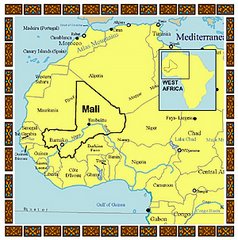





I remember the posters for Peace Corps recruitment in the US. Written in white print above a photo of a child in a worn t-shirt with a giant smile: The Toughest Job You’ll Ever Love. Trite, of course. But now, ten hours before I board a plane to leave Mali, it rings true. Joining the Peace Corps was one of the best decisions I’ve ever made.
On Sunday M’Pedougou held my going-away party. After a morning of soft drizzle, they hauled the balafons and speaker system out and set up in the center of village. People trickled out and gathered, kids, women, men, old people, everyone in the village and even the neighboring villages was there. A car arrived, and I was surprised to see men in suits step out! The mayor had showed up with some bigwig politicians from Sikasso, and they quickly made use of the sound system. There were long greetings and many thanks. One man said, "Do you know what she had to give up in order to come here? She left her family, her friends, her culture, her food... " A man from a nearby village that I had worked in gave me a massive rooster, a gift from the women's group. Finally, my close friend Yaya gave the mayor a package, and they presented me with a giant mud cloth depicting the history of Sikasso. It was a gift from my village so that I would remember them. As if I could forget. Finally I got up and gave an impromptu speech:
“ I left my house two years ago with no idea what was waiting for me in Africa. But I found you. We’ve now spent two years farming together, making tea together, eating together, cooking together. We dance together and take care of each other when we’re sick. You have become the largest family I’ve ever had, and I will never ever forget you and the warmth with which you welcomed me. …” and so on. It was cheesy but it was also true.
I choked up a bit as I looked out at the sea of faces that smiled back at me. I knew everyone. Every face I paused on brought a fresh memory and I had the overwhelming sensation that I will never experience anything like this again. I won’t know the names of all my neighbor’s kids and go help them grow their food. I won’t run from rainstorms through wet corn fields. I won’t sit under ripe mango trees listening to soft keys of balafon on the radio and greeting everyone who passes.
So now for some more fun: A self-interview
How has Peace Corps changed me?
-I’m infinitely more patient, and I walk slower.
-I value family and friends and spending time with these people much more highly. It is so easy in the States to get caught up in seeking. I was a very achievement oriented person before Peace Corps – getting good grades, pole vaulting, whatever it was, it was always my most important priority. I think living with a small village has opened my eyes to the importance of putting people first and valuing relationships.
-My intestines will forever be scarred…
Best parts of Peace Corps?
-The time span. It is so special to be able to spend two years with people, to see people change and to gain their trust. My friend Alimatu got pregnant, gave birth, and now her little baby is starting to walk. I also loved planting the fields, weeding, then harvesting, and then eating that same food. Seeing the entire life cycle is a huge benefit to the two year time span of Peace Corps.
-Being able to speak Bambara fluently.
-Balafon music and dancing under the stars
Worst parts of Peace Corps?
-The illnesses…. From intestinal amoebas to malaria, and I even once had a giant swollen lip that looked like a horror story: “Collagen Gone Wrong!”
-Boredom.
-Getting harassed by little children constantly chanting “Tubabu! Tubabu! Tubabu!” (white person).
-Transportation - 60 hour bus rides, Goat pee dripping down from the roof into the window, 10 hours delays, breakdowns, crazy busdrivers, sleeping in bus stations...
I guess the "worst" parts do make the best stories.
I have a heart bursting with love for this country and the people I grew to know, but I am ready to come home and spend time with my own people. It’s been an adventure of a lifetime. Truly the toughest job I’ll ever love.












